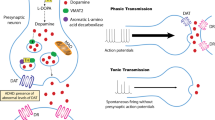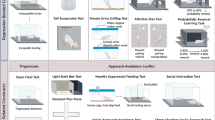Abstract
110, 210, and 310 day old rats were trained to display immobility and defecation in a grid box while under the influence of 0, 0.5, 1.5, or 2.5 mg/kg reserpine. Drug injections were given every 48 hours and began 7 days prior to training. Acquisition consisted of one training trial per day for 5 days, and was followed by 5 days of extinction at the rate of two trials per day. The results showed substantial dose-dependent weight losses over all three age groups. Weight loss was found also to be a function of the training procedure, with the younger rats showing the greatest decrements. In addition, it was determined that reserpine-treated animals experienced considerable difficulty learning a new motor and visceral response, thereby raising the possibility that reserpine treatment and instrumental blood pressure conditioning may be incompatible procedures for controlling essential hypertension. In addition, it was suggested that age of the adult subject be included more frequently as an independent variable in further behavioral and pharmacological studies.
Similar content being viewed by others
References
APPEL, J. B. 1963. Drugs, shock intensity, and the Cer. Psychopharmacologia, 4, 148–153.
BOYANER, H. G., & RADOUCO-THOMAS, S. 1971. Partial antagonism by exogenous calcium of the depressant effect of reserpine in rat shuttle-box behavior. Brain Research, 33, 589–591.
ELDER, S. T. 1964. Influence of anterior cortical lesions upon the Cer to auditory stimulus under non-extinction. Psychological Reports, 14, 603–610.
ELDER, S. T., & EUSTIS, N. K. 1975. Instrumental blood pressure conditioning in out-patient hypertensives. Behavior Research and Therapy, 13, 185–188.
ELDER, S. T., MORIARITY, D. D., & KUEHNE, T. E. 1970. Approach-avoidance conflict. Role of olfactory cues. Psychological Reports, 27, 631–638.
ELDER, S. T., RUIZ, Z. R., DEABLER, H. L., & DILLENKOFFER, R. L. 1973. Instrumental conditioning of diastolic blood pressure in essential hypertensive patients. Journal of Applied Behavior Analysis, 6, 377–382.
ESTES, W. K., & SKINNER, B. F. 1941. Some quantitative properties of anxiety. Journal of Comparative Psychology, 29, 390–400.
FRIES, E. D. 1971. The chemotherapy of hypertension. Journal of the American Medical Association, 218, 1009–1014.
GIBSON, S., MCGEER, E. G., & MCGEER, P. L. 1970. Effect of selective inhibitors of Tyrosine and Tryptophan Hydroxylases on self-stimulation in the rat. Journal of Experimental Neurology, 27, 283–290.
KIMBLE, G. A. 1955. Shock intensity and avoidance learning. Journal of Comparative and Physiological Psychology, 46, 281–284.
MAHER, B. A., & MCINTYRE, R. W. 1960. The extinction of the Cer following frontal ablation. Journal of Comparative and Physiological Psychology, 53, 548–552.
ROBINSON, D. S., DAVID, J. M., NIES, A., RAVARIS, C. L., & SYLVESTER, D. 1971. Relation of sex and aging to monoamine oxidase activity of human brain, plasma, and platelets. Archives of General Psychiatry, 24, 536–539.
SAUNDERS, D. R., PAOLINO, R. M., BOUSQUET, W. F., & MIVA, T. S. 1974. Age-related responsiveness of the rat to drugs affecting the central nervous system. Proceedings of the Society for Experimental Biology and Medicine, 147, 593–595.
SEIDEN, L. S., & CARLSON, A. 1963. Temporary and partial antagonism by L-Dopa of reserpine-induced suppression of a conditioned avoidance response. Psychopharmacologia, 4, 418–423.
SEIDEN, L. S., & MARTIN, T. W. 1971. Potentiation of effects of L-Dopa on conditioned avoidance behavior by inhibition of extra-cerebral dopa decarboxylase. Physiology and Behavior, 6, 453–458.
SHAPIRO, D., TURSKY, G., GERSHON, E., & STERN, M. 1969. Effects of feedback and reinforcement on the control of human systolic blood pressure. Science, 163, 558–590.
SPARBER, S. B., & SHIDEMAN, F. E. 1968. Prenatal administration of reserpine: effect upon hatching behavior and brainstem catecholamines of the young chick. Developmental Psychobiology, 1, 236–244.
SPARBER, S. B. & SHIDEMAN, F. E. 1969. Detour learning in the chick: effect of reserpine administered during embryonic development. Developmental Psychobiology, 2, 56–59.
STREB, J. M., & SMITH, K. 1955. Frontal lobotomy and the elimination of conditioned anxiety in the rat. Journal of Comparative and Physiological Psychology, 48, 126–219.
TRABOSSO, T. R., & THOMPSON, R. W. 1962. Supplementary report: shock intensity and unconditioned responding in a shuttle box. Journal of Experimental Psychology, 63, 215–216.
Author information
Authors and Affiliations
Additional information
All drugs used in this project were donated by the Pharmacy Research Division of CIBA Pharmaceutical Company, Summit, New Jersey 07901. We are indebted to Behavior Science Industries, Ltd. for partial financial support. A preliminary report of these data was presented at the American Psychological Association meetings in New Orleans, 1974.
Rights and permissions
About this article
Cite this article
Elder, S.T., McLean, J.H. Motor and Visceral Learning Deficits in Reserpine-Treated Rats. Psychol Rec 26, 233–241 (1976). https://doi.org/10.1007/BF03394381
Published:
Issue Date:
DOI: https://doi.org/10.1007/BF03394381




